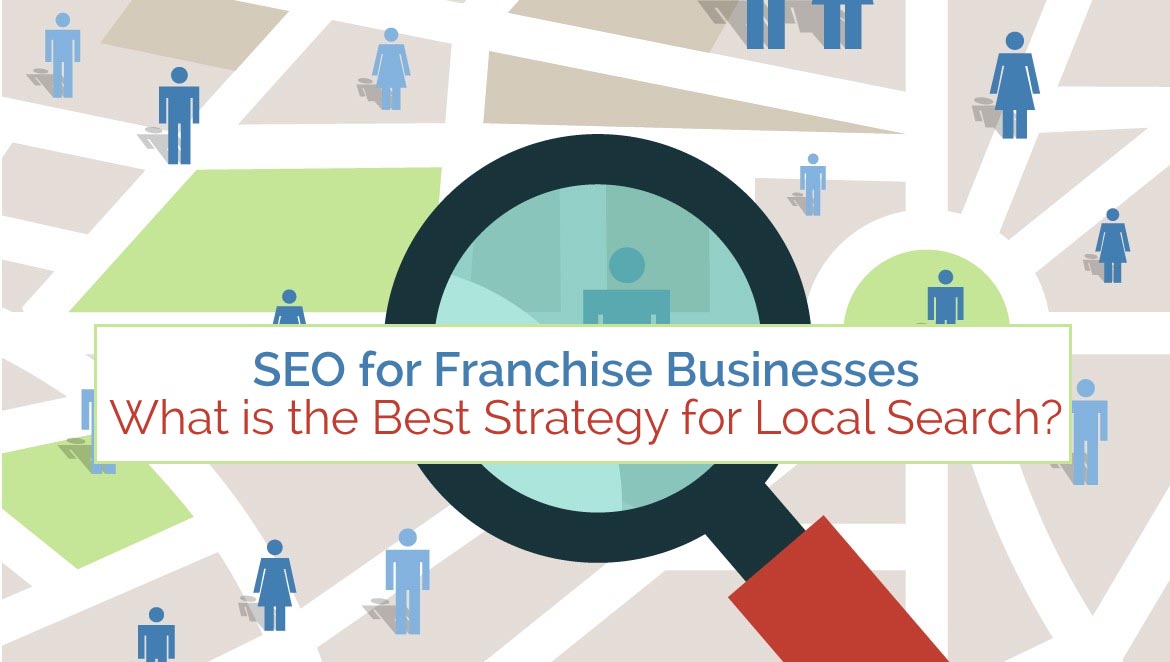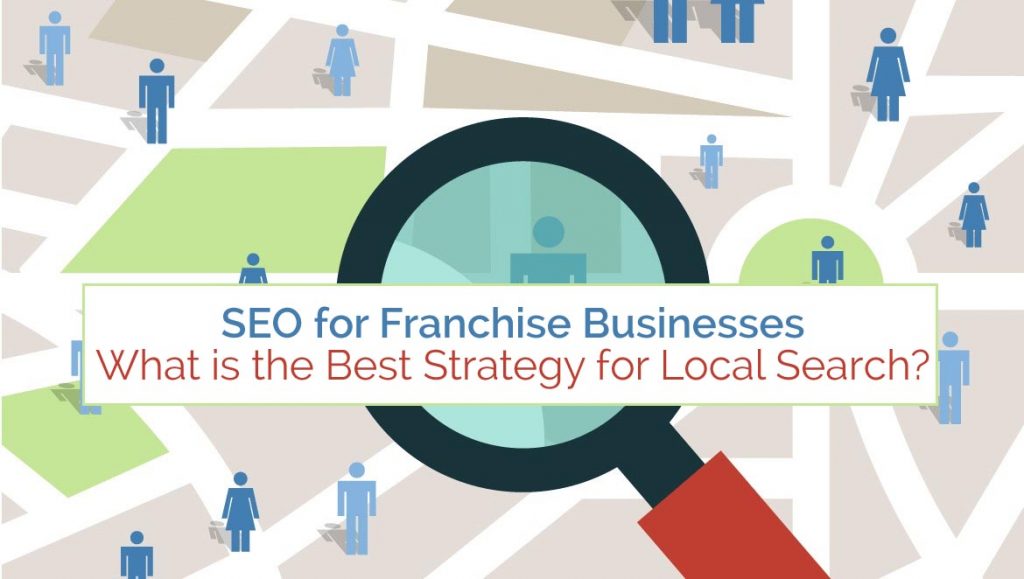Franchises – What is the Best Strategy for Local Search?
One of the main reasons that someone would purchase a franchise is to take advantage of a proven business model and to tap into the experience and expertise of the Franchisor. Franchisors may also try to convince prospective franchisees that they are allowing you to take advantage of their “brand recognition” and the level of value that recognition affords you. While this may be the case with some larger national franchises, a vast majority of available franchise opportunities are not household names and national brand recognition should not be a motivating force behind your decision to purchase a franchise.
A franchise is an agreement between two parties, a Franchisor and the Franchisee. The contract allows the Franchisee to use the Franchisor’s brand, along with the ability to obtain products, services and business support and training from the Franchisor. In exchange for conducting business under the brand’s service mark the Franchisee is often obligated to follow and adhere to strict guidelines including, but not limited to, use of specific furnishings, signs, collateral material and other corporate branding compliance as well as the requirement to pay certain other fees and royalties
There are a few different types of Franchises:
- Product Distribution Franchise –with this type of agreement, manufacturers (franchisors) allow retailers to distribute their products and to use their names and trademarks.
- Business Format Franchise – authorized to conduct a business according to a system developed by the Franchisor.
- Process or Manufacture Franchise – with this type of agreement, the franchisor supplies a critical ingredient or know-how for a production process.
While each franchise has its own set of unique sales and marketing challenges, most franchises impose tight control on franchisees and enforce strict guidelines on how their product or service is presented, marketed and ultimately sold.
Local Franchisees Must Be Marketed Locally
The goal of this post is to review some of the common online marketing methods employed by Franchise organizations to promote their local Franchisees and to provide suggestions with respect to the best solution to directly enhance the success of the local Franchisee resulting in long term growth for the Franchisor.
The first thing that we need to agree on is the fact that a Franchise is a “Local Business” and in order for this local business to be successful in a geographically targeted marketplace the business must be marketed locally. It cannot be overlooked that even though the Franchisee may be part of a national organization, each location is truly a stand-alone local business and is competing directly in their local marketplace and therefore must be marketed as an individual business in order to maximize their online exposure and lead generation.
This is evidenced by research that shows the number of searches that have “local intent” is increasing rapidly (currently over 50%). Local intent simply means that instead of searching for the generic phrases “in-home care” or “senior housing advisor”, people are actually searching for more geographically targeted phrases such as “best in home care agency 60618” or “senior housing advisor Dallas TX”. When you think about it, it makes perfect sense. The search engines want to return results that are most relevant to the searcher’s query. If you live in Chicago and you need in-home care for your elderly parent, why would you search simply for “in-home care”, when a more targeted search with local intent (best in home care agency 60618) is more likely to provide you with the results you are looking for?
Should Franchisees Have Individual Websites?
The short answer is yes, but they need to be structured properly.
The subject of individual franchisee websites has long been a “bone of contention” within the industry. Many Franchisors are vehemently opposed to individual Franchisee websites and are reluctant to relinquish website control to Franchisees. On the other hand, many Franchisees feel that their “hands are tied” since they have little or no control over the marketing decisions for their own business. These feelings become even more apparent when the local Franchisee determines that the Franchisor’s marketing campaign is ineffective and the resulting new business lead generation is virtually non-existent.
Why most Franchises Fail at SEO
Initially, many clients contact us to either design a new website or help market their business online. Somehow, they feel that the two are mutually exclusive from one another. For example, they will consider building a new website, but, at the same time, they’re not at all thinking about how that new website will generate traffic and leads. What seems to consistently be misunderstood is the fact that you really can’t separate web development from online marketing and expect to be successful online. Each needs to be built with the other in mind and work in sync to achieve your marketing goals.
Web development for franchise organizations takes a great deal of strategic planning. In most cases, franchises require an expanded web presence that targets a variety of prospects in order to be successful online. Many of the options for franchise website design include a main company website for the franchise organization, a separate website for franchise sales and marketing and marketing websites for individual franchise owners (franchisee websites).
Before we tell you why they fail, let’s first take a quick look at some of the most common online marketing practices being employed by franchise organizations. Remember, the strategies chosen by these franchises are directly related to several key factors, including, the type of franchise business, their online marketing budget and the amount of control they are willing to provide to each franchisee.
There are basically 4 scenarios when it comes to Franchise marketing online:
- Stand-Alone Franchise Website
- Single Franchisee Location Pages
- Local Franchisee Microsites
- Individual Franchisee Marketing Websites
Stand Alone Franchise Website
This option is the worst case scenario for local SEO. The Franchise would develop a main company website with information about the products or services provided as well as social media integration and “franchise opportunity” content.
Pros
The only advantage of this option is that the cost of maintenance and support for a single site would be the least expensive option.
Cons
The biggest disadvantage of choosing this option would be the lack of traffic and lead generation. Basically the value to the Franchisee would be “zero”.
Franchise Website with Single Franchisee Location Pages
The only difference between this option and the stand-alone option above would be the integration of a “location finder” type of feature where site visitors could find a local franchisee if and when they performed a search. Oftentimes these single location pages have a generic layout with contact information for each franchisee (location) along with a profile or description that can customized by the franchisee with location-specific content.
Pros
While this option is a small step (very small step) in the right direction, it falls far short of the necessary effort to provide an effective platform for franchisees to market themselves.
Cons
Even though this option provides a limited amount of exposure for the local franchisees, it is next to impossible to successfully optimize a singular page for more than one or two geographically targeted keywords or phrases. Unless you are a Franchisee of a known national brand (Subway, McDonalds, KFC, Burger King, etc.), or you are conducting business a geographic area with extremely low competition, your chances of success are greatly diminished with this option.
Local Franchisee Microsites or Minisites
As an alternative to the single franchisee location page option, some franchisors elect to provide local microsites (with multiple pages) for each location. Oftentimes these “microsites” (small site) reside within the franchisor’s main website and provide each location owner an opportunity to customize and optimize these location specific pages.
Pros
This strategy allows the franchisees to showcase their business differentiators while giving them, at least, a “fighting chance” (albeit a small chance) of competing in their local market.
Cons
The downside of this option is the cost of development, maintenance and oversight of these microsites. Another concern would be the duplication of content. In a perfect world these sites would appear to be individual sites and, in turn, contain unique relevant content that is targeted to the individual franchisee, unique services provided and their geographic market served.
Individual Marketing Websites for Franchisees
In our professional opinion, providing (or allowing) franchisees with the ability to have and maintain an individual marketing website is the best option for local franchisee SEO and, in turn, develop long term value in their business, directly enhancing the success of the local franchisee resulting in long term growth for the franchisor.
We understand that some franchisors are “cringing” with every sentence they read. The upfront costs alone might make your marketing director shake in their boots. But we feel that this is a very short-sighted outlook and that providing individual marketing websites for local franchisees is the best chance for franchisees to build authority in each local market and develop long term value for the franchise organization
Pros
While some franchisors might be worried about losing control by having a network of franchisee websites or that the “brand” or main website may be detrimentally affected, the fact is, when done correctly, the opposite is true. These individual marketing sites would only help to reinforce the brand and assist in supporting the main website. With proper strategic planning, architecture development, keyword and market research as well as written specification and guidelines, these individual marketing websites for franchisees can follow specified branding and content guidelines to ensure a consistent look and feel, while allowing each location site to contain unique, location-specific content that will help you, and your franchisees, succeed online.
Conclusion
Most franchise organizations fail at local SEO because they choose the wrong strategy or are simply afraid to relinquish enough control to empower their franchisees to become successful. It’s a double edge sword. On one hand the franchisor wants to control everything that the franchisee does, while strictly limiting the way that their products or services are presented, promoted and sold. And on the other hand, these limitations are, in many cases, holding back many of the organization’s “top-producers” from directly growing their businesses and severely limiting the fee revenue collected by the franchisor. If your business revenue model is based on fees and royalties, it would seem to be in the best interest of the organization to empower their local franchisees to grow their business, expand market share and become more successful. Unfortunately that is not always the case.
With proper local SEO for each of these franchisee marketing websites, the resulting increase in targeted traffic and online lead generation would serve as a positive motivator, increasing each franchisee’s enthusiasm and satisfaction and providing the franchisor with an excellent marketing tool to share with other prospective franchisees.










